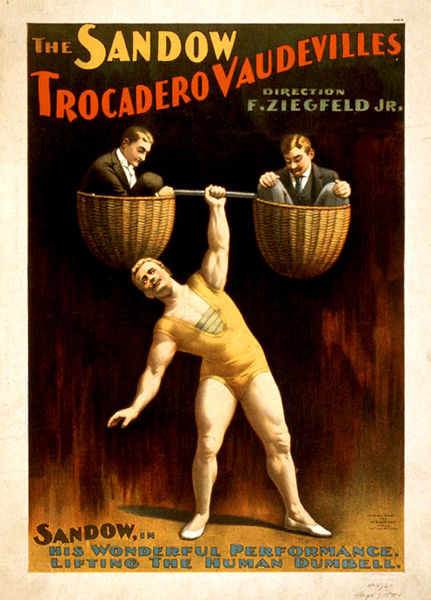From a typically eccentric Adam Curtis essay, “Bodybuilding and Nation-Building,” a look at how developing muscles was begun as a riposte to industrialization:
“At the end of the nineteenth century a fanatical craze for physical fitness swept through Britain. Millions of men and women took up gymnastics, body building and other physical exercises.
Such a thing had never happened before – and it was given a name – Physical Culture.
The craze had an almost religious intensity because those who promoted it said that it was the only way to prevent the British nation – and its Empire – from collapsing. Behind this was a powerful belief that the modern world of the 1890s – the teeming cities with their slums and giant factories – was leading to a ‘physical degeneracy’ in millions of people.
It was a fear that had started with the elite who ran Britain’s public schools. Matthew Arnold warned of ‘the strange disease of modern life’ with its ‘sick hurry’ and ‘divided aims.’ Out of that came a movement called ‘Muscular Christianity’ which wanted to recreate the kind of heroic human being that existed before industry and the modern world came along and corroded everything.
It was a vision of a restored physical and moral perfection in the young men who were going to run the empire. And it involved doing lots of exercises in new things called Gymnasiums. Then liberal reformers got worried about the working classes – convinced that the slums were leading to a ‘physical degeneracy.’ So they persuaded lots more people to do exercises.
Then a figure rose up who united all of this dramatically into a mass movement. He was called Eugen Sandow.
Sandow came from Prussia, he started as a circus and music-hall performer. But then in the late 1890s he invented something he called ‘body-building.’ It caused a sensation throughout Europe and America – and he became a massive celebrity because he was seen as the leader of a crusade of Physical Culture that was going to stop the degeneracy that was plaguing Britain.” (The Browser.)
Tags: Adam Curtis, Eugen Sandow

